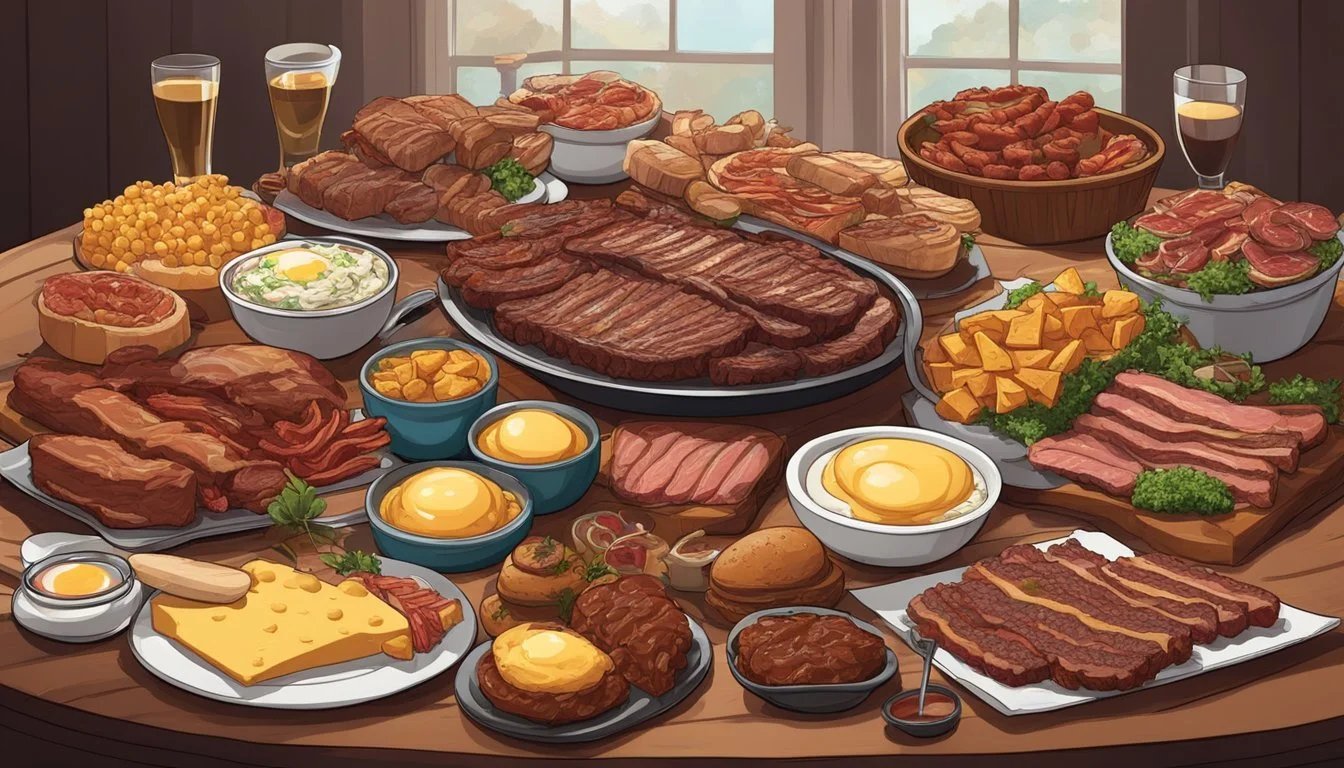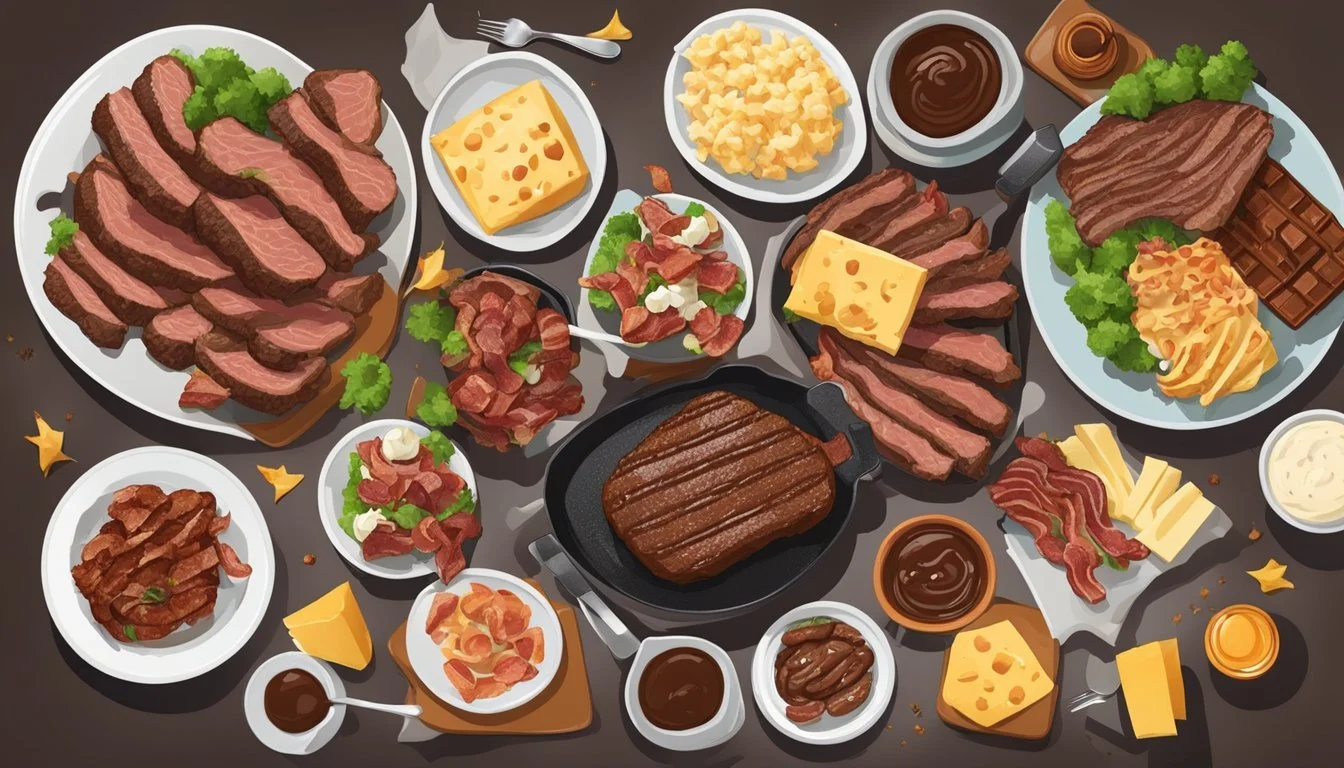Cheat Days on the Carnivore Diet
Strategies for Occasional Indulgences
This Article is Part Of Our Guide on the Carnivore Diet
The concept of a cheat day on a carnivore diet often sparks curiosity and debate among those following this strict regimen. A carnivore diet, built exclusively around animal products, leaves no room for the conventional treats and comfort foods often associated with cheat days. Proponents of the carnivore diet subscribe to it for various reasons, from seeking weight loss to attempting to resolve autoimmune issues, and thus, the consideration of a day off from this regime is met with caution.
A cheat day on a carnivore diet may not only disrupt the physiological adaptations to an all-meat regime but can also introduce side effects. These can range from gastrointestinal discomfort to swings in energy levels, given the diet's restrictive nature. Individuals following the diet may find the sudden reintroduction of carbohydrates and sugars (how long does sugar last?), typical in many cheat day foods, jarring to their systems.
Despite these potential side effects, some individuals on a carnivore diet express the desire for occasional indulgence. Whether a cheat day includes sugary beverages, confections, or starchy foods, it is a deviation from the diet's strict guidelines. While some argue that the mental break can be refreshing, others believe that it can hinder progress or reboot cravings for sugars and processed foods. Thus, the inclusion of a cheat day in a carnivore diet is a personal decision, albeit one that requires careful consideration given the diet's unique nature and its effects on the body.
Understanding the Carnivore Diet
In exploring the Carnivore Diet, one must recognize its strict focus on animal products and the exclusion of carbohydrates. At its core, the diet emphasizes eating meat, fat, and limited dairy while omitting all plant-based foods.
Principles of Carnivore Eating
The Carnivore Diet is grounded in the consumption of animal products exclusively. This includes:
All types of meat (beef, pork, chicken, fish)
Organ meats for nutrient density
Fatty cuts of meat to maintain energy levels
Eggs and limited dairy such as cheese and butter
This dietary approach eliminates all carbohydrates, fiber from plants, and processed foods, adhering to a zero-carb philosophy.
Health Benefits and Risks
Adherents report weight loss, improved energy levels, and simplification of meal planning as significant benefits. The Carnivore Diet is an elimination diet that may help in reducing symptoms of autoimmune diseases by removing potential inflammatory triggers like gluten or lectins found in plant-based foods.
However, one should consider the health risks:
Potential nutrient deficiencies due to lack of plant-derived nutrients
Increased risk of elevated cholesterol and heart issues
Potential for digestive issues due to lack of fiber
Comparison to Keto and Paleo Diets
Keto and Paleo diets are similar to the carnivore approach in that they focus on reducing carbohydrate intake:
Keto aims for a state of ketosis, where the body burns fat instead of carbs for energy, but it allows for low carbohydrate intake.
Paleo focuses on eating whole, unprocessed foods and eliminates dairy and grains, not all carbs.
Both diets include plant-based foods, unlike the Carnivore Diet, which stands out with its zero-carb stance. The emphasis on consuming high-fat and protein-rich foods is a common ground, but ketosis is not the primary aim of carnivore eating.
Planning Cheat Days
Cheat days on a carnivore diet require careful consideration to minimize potential side effects and avoid derailing progress. They involve strategically selecting when to indulge, choosing appropriate foods, and understanding the psychological effects.
When to Have a Cheat Day
A cheat day should be planned rather than impulsive, aligning it with special occasions or after a substantial period of adherence to the carnivore diet. They should be infrequent to prevent a cycle of weight gain and digestive problems that may arise from frequent shifts in dietary habits. The right timing can help mitigate the risk of falling off the wagon due to strong cravings or temptation.
Frequency: Typically, one cheat day every few weeks or once a month to maintain health goals.
Special Occasions: Might align with holidays, birthdays, or social events.
Choosing Cheat Day Foods
Selecting cheat day foods involves balancing cravings with the potential impact on one's health. A mix of preferred treats and nutrient-dense options like cheese and eggs can provide satisfaction without excessive intake of junk food.
Preferable Options:
Dairy: Full-fat cheese, yogurt
Processed Meats: Bacon (how long does bacon last?), sausages
Others: Dark chocolate, fruits
Foods to Limit: High-sugar and ultra-processed junk foods
Psychological Impact of Cheating
The impact of a cheat day extends beyond the physical to the psychological. It's important to avoid viewing cheat days as a reward, which can lead to an unhealthy relationship with food and potential addiction. One should recognize cheat days as part of a dietary pattern that includes occasional flexibility, helping to manage appetite and prevent feelings of deprivation.
Managing Appetite: Knowing a cheat day is an option can help maintain strict adherence on other days.
Avoiding Guilt: Understanding that an occasional indulgence is normal can alleviate guilt and help prevent falling off the wagon.
Effects of Cheat Days on the Body
Cheat days on a carnivore diet can interrupt progress and trigger physical responses that impact weight, digestion, and blood sugar. These alterations can have both immediate and delayed effects on health.
Impact on Weight and Health
Cheat days often lead to weight gain as they typically involve consuming foods high in carbohydrates and sugars, which can disrupt the fat-adaptation process. The ingestion of carbohydrates can temporarily halt fat burning, prompting the body to store these excess calories as fat. Additionally, the reintroduction of non-carnivore diet foods can reignite cravings and lead to a cycle of cheating, which can perpetuate weight gain and affect overall health. A single cheat day could potentially undo the progress of diet adherence, challenging the maintenance of healthy weight and consistent muscle to fat ratio.
Digestive Response to Cheat Days
Cheat days introduce foods that the body may no longer be accustomed to, potentially causing digestive problems. Common digestive responses include bloating, constipation, or diarrhea. The sudden intake of fibrous or processed foods can disrupt the gastrointestinal tract, leading to discomfort, and in some cases, electrolyte imbalance, which may exacerbate feelings of fatigue.
Ketosis and Blood Sugar Variations
Adhering to a carnivore diet typically keeps the body in a state of ketosis, wherein fat is utilized for energy instead of carbohydrates. Cheat days, particularly those incorporating fast food or high-sugar items, cause sharp blood sugar spikes, which necessitate a greater insulin response. This not only disrupts ketosis but can lead to a rollercoaster of blood sugar levels that incites further cravings and mood swings. Exiting ketosis can take the body time to return to its adapted fat-burning state, during which the benefits of the carnivore diet may not be fully realized.
Optimal Foods for Cheat Days
When implementing cheat days within a carnivore diet, one should choose foods that minimize potential negative effects while also satisfying cravings. It's important to select items that can be enjoyed without derailing dietary goals.
Animal-Based Cheat Options
For those who want to stick close to the carnivore diet ethos, even on cheat days, there are indulgent animal-based options that can serve as treats. Steak, particularly fattier cuts like ribeye, can be savored for their richness and flavor beyond the usual menu. Organ meats provide variety and are packed with B vitamins. Cheese and eggs can add new textures and tastes while still maintaining an animal product focus. For a salty snack, beef jerky (how long does beef jerky last?) or bacon can be satisfying choices.
Low-Impact Carbohydrates
Including low-impact carbohydrates in a cheat meal can provide a psychological break without causing a major disruption in one's diet. Options like sweet potatoes or squash can offer a comforting, starchy component to a meal while still providing fiber and vitamins. Whole grains, such as quinoa or oats, could also be incorporated for those seeking minimal inflammatory response. If one craves pasta, choosing varieties made from legumes can provide a protein-rich alternative.
Incorporating Fruits and Vegetables
Fruits and vegetables can be a delightful addition to a cheat day while still aligning with health-conscious decisions. They are sources of fiber, antioxidants, and essential nutrients. For breakfast, one might consider adding an apple or berries, which offer sweetness along with beneficial fiber and vitamins. A dinner could be enhanced with a variety of colorful vegetables like spinach or broccoli, which contribute both texture and nutrition. A freshly made bone broth with added vegetables can be both nourishing and comforting.
Foods to Avoid on Cheat Days
When considering cheat days on a carnivore diet, it's crucial to acknowledge that certain foods can negate the benefits of the diet and may lead to undesirable side effects. These foods can cause a range of reactions, from blood sugar spikes to digestive discomfort, such as bloating and constipation.
Highly Processed Foods
Highly processed foods are typically rich in additives and low in nutrients. They are often designed to be addictive, which can lead to overconsumption and a cycle of cravings. Examples include:
Fast food items like fries or burgers (minus the bun for a more carnivore approach)
Snack chips and other packaged items
Trigger Foods and Additives
Foods that commonly trigger a negative response should be avoided. Additives that may cause an immediate sugar spike or disrupt digestion include:
Pasta, which can cause bloating and discomfort
Foods containing artificial sweeteners or colorings
Excess Sugars and Unhealthy Fats
A high intake of sugars and unhealthy fats can result in blood sugar instability and may contribute to long-term health issues. One should avoid:
Sugary drinks, which can lead to a rapid sugar spike and subsequent crash
Junk food like candy or baked sweets, which often contain both high sugar and unhealthy fats
Meal Planning and Recipes
The following section details strategic approaches to incorporating cheat days into a carnivore diet, providing a curated cheat day menu, and guidance for rebalancing after indulging.
Preparing for Cheat Days
One must approach cheat days with intention and planning to optimize health and maintain energy levels. Preparation involves evaluating the weekly meal plan to include a variety of nutrient-rich carnivore options. It is imperative to ensure ample supply of electrolytes, which may be diminished during cheat days. In preparation, individuals might consider meals high in fiber the day before a cheat meal to help mitigate any digestive discomfort.
Sample Carnivore Diet Cheat Day Menu
A thoughtfully planned menu can satisfy the appetite without forsaking dietary goals. A cheat day menu might start with a breakfast of eggs and bacon, which stays relatively true to carnivore principles while allowing for some leniency. For lunch, one could indulge in a cheeseburger without the bun, adding a slice of cheese for a touch of dairy. Dinner could include a more liberal cheat meal, such as a serving of barbecued ribs with a side of a simple garden salad, incorporating both flavor and a rare addition of vegetables to the diet.
Breakfast
Eggs (cooked to preference)
Bacon
Lunch
Burger patty
Slice of cheese (optional)
Dinner
Barbecued ribs
Garden salad (limited quantity)
Post-Cheat Day Adjustments
After a cheat day, it's important to reassess the meal plan to ensure a return to a strict carnivore meal plan, focusing on protein and fat-rich foods to rebalance the body. Individuals may wish to consume meals that are particularly rich in electrolytes to restore any potential imbalances. Hydration should be a priority, and one may consider increasing water intake to support digestive health.
Coping with the Aftermath of Cheating
After a cheat day on the carnivore diet, individuals may experience increased cravings and disruptions in their usual dietary routine, which can affect weight and overall health. Careful management of cravings and a strategy to realign with the diet can help mitigate potential issues such as blood sugar fluctuations and digestive discomfort.
Managing Cravings Post-Cheat Day
Post-cheat day cravings can be intense as the introduction of carbohydrates and sugars can lead to blood sugar spikes and a renewed appetite for these foods. It's important to replenish electrolytes, as an imbalance can exacerbate cravings. One can counteract cravings by:
Increasing water intake to help flush the body and reduce bloating.
Consuming high-fat meats like bacon, which can help satiate and stabilize energy levels.
Staying occupied with activities to distract from the urge to continue cheating.
Getting Back on Track
To mitigate weight gain and health issues associated with falling off the wagon, one should return to the carnivore diet immediately after a cheat day:
Resume normal eating patterns quickly to reestablish dietary consistency.
Opt for simpler, easily digestible foods such as lean meats to ease any digestive problems such as constipation, diarrhea, or bloating that may have arisen.
Document the experience in a diet journal (FAQ style) to identify triggers and formulate strategies to prevent future occurrences.
When to Seek Professional Advice
If cheating leads to significant health disturbances or signs of addiction, one should consider seeking professional advice. Warning signs include:
Uncontrollable appetite changes or cravings.
Prolonged digestive problems that do not resolve with a return to the diet.
Severe fluctuations in weight or blood sugar levels.
In such cases, consulting a healthcare provider or a dietitian experienced in the carnivore diet can provide personalized guidance for getting back on track and avoiding cheat days in the future.
FAQ About Carnivore Diet Cheat Days
This section is dedicated to addressing frequently asked queries surrounding the concept of incorporating cheat days into a carnivore diet regimen, delving into the impact on health, weight loss strategy, and potential side effects.
Common Questions Answered
What constitutes a carnivore diet cheat day?
A cheat day on the carnivore diet typically involves the consumption of foods that are not part of the strict all-animal product menu. This may include carbs, fiber-rich foods, and even sweetened treats which are otherwise eliminated in a carnivore meal plan.
How can cheat days affect health and weight loss?
Weight Loss and Ketosis: Cheat days can disrupt the state of ketosis achieved on a zero-carb diet, potentially slowing down weight loss. Consuming carbs can lead to a temporary increase in water weight and may cause a sugar spike, which disrupts fat burning.
Digestive Health: The sudden intake of fiber and carbs during a cheat day may cause digestive issues such as bloating and diarrhea for individuals used to a carnivore diet, as their gastro-intestinal tract is not accustomed to processing these types of food.
Are there benefits to having cheat days?
For some, a cheat day may offer psychological relief and can help manage cravings, making it easier to stick with the restrictive diet in the long term. However, it can also cause a setback in progress and lead to "falling off the wagon," where one cheat meal turns into extended periods of unregulated eating habits.
What are the potential side effects of a cheat day?
Blood Sugar Fluctuations: Individuals may experience blood sugar spikes followed by crashes, leading to increased hunger, cravings, and fatigue.
Hormonal Imbalance: Cheat days can also affect hormones that regulate hunger and satiety, like ghrelin and leptin, potentially leading to poor mood and overeating.
Skin and Mood Issues: Some people notice acne breakouts and a poorer mood associated with the reintroduction of sugar and processed foods.
How can one handle temptation and avoid cheat days?
Strategies to manage temptation include planning satisfying carnivore-friendly meals that are high in fatty meats to maintain satiety, incorporating intermittent fasting to regulate hunger cues, and finding healthier cheat day alternatives that align more closely with the carnivore diet, such as using animal-based products like cheese or eggs when craving different textures or flavors.
Can supplements help manage the impact of a cheat day?
While no supplement can negate the effects of a cheat day, certain supplements may support overall health during such deviations. These include B vitamins for energy metabolism, vitamin D for its role in bone health and immune function, and antioxidants to combat oxidative stress. However, these are general supplements and should not be used as a justification for regular cheating.
Connect with the Community
When considering a carnivore diet cheat day, it benefits practitioners to connect with others who share their dietary choices. Engaging with the community can provide support, as well as diverse perspectives on how to manage cheat days effectively.
Social Media Groups and Forums
Social media platforms, like Facebook, host numerous groups dedicated to the carnivore diet, where members can discuss their experiences and strategies. On these forums, individuals like Mike Fishbein, an advocate for community building, encourage open discussion and knowledge sharing. Participation in these groups allows dieters to:
Ask questions and receive advice from more experienced members
Learn about how to incorporate a balanced diet within the carnivore lifestyle
Stay motivated by reading about others' success stories
Sharing Experiences and Tips
In these groups, sharing personal experiences and tips about handling cheat days is commonplace. Dieters often find it beneficial to:
Post about their own cheat day experiences and the consequences they've faced
Offer practical strategies for getting back on track after deviating from the diet
Engage in discussions about the impact of cheat days on one's mood and overall well-being
By engaging with a community, individuals following a carnivore diet can navigate their journey with informed confidence.





